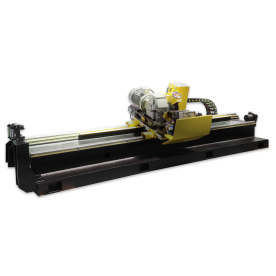
Understanding the Importance of Spare Parts for Annealing Machines in Industrial Production: Ensuring Efficiency and Longevity
****
The annealing process is crucial in various industrial sectors, from metalworking to glass manufacturing. It involves heating materials to a specific temperature and then allowing them to cool at a controlled rate. This process is essential for altering the properties of metals and other materials—improving their ductility and reducing hardness, thus making them easier to work with. However, like any machine, annealing machines are subject to wear and tear, which necessitates the availability of high-quality spare parts for uninterrupted operation. In this article, we will delve into the significance of spare parts for annealing machines and how they contribute to efficiency, reliability, and the overall productivity of industrial operations.
**The Role of Spare Parts in Annealing Machines**
Annealing machines come in various designs, including batch-type furnaces and continuous machines, each serving different purposes in industrial applications. Just as with any complex system, the longevity and effectiveness of these machines greatly depend on the availability and quality of spare parts. Spare parts are components that can be replaced when the original parts become worn out, damaged, or outdated. Their importance cannot be overstated, as they ensure that the machines continue to operate at optimal levels.
1. **Quality and Compatibility**
When it comes to spare parts for annealing machines, quality and compatibility are paramount. Using substandard or incompatible parts can lead to a plethora of issues, from decreased efficiency to complete system failures. Industrial operators must ensure that they procure parts that are either original equipment manufacturer (OEM) parts or high-quality aftermarket alternatives. This is essential not only for maintaining the machine’s performance but also for safeguarding worker safety and product quality.

Understanding the Importance of Spare Parts for Annealing Machines in Industrial Production: Ensuring Efficiency and Longevity
2. **Minimizing Downtime**
One of the most challenging aspects of running an efficient industrial operation is minimizing downtime. Unexpected machine failures can lead to significant losses in productivity. By maintaining an adequate inventory of spare parts, companies can respond quickly to breakdowns, ensuring that production processes continue without significant interruptions. This preparedness is crucial in today’s competitive market, where even a small delay can result in lost contracts and diminished customer satisfaction.
3. **Regular Maintenance and Replacement**
Regular maintenance is essential for the longevity of annealing machines. Scheduled inspections and part replacements help identify potential problems before they escalate into major issues. Components commonly requiring replacement include heating elements, thermocouples, insulation materials, and control systems. By following a proactive maintenance plan, operators can replace worn parts with high-quality spares, ensuring that the machines function correctly.

Understanding the Importance of Spare Parts for Annealing Machines in Industrial Production: Ensuring Efficiency and Longevity
4. **Reducing Total Cost of Ownership**
Investing in spare parts for annealing machines might seem like an additional cost, but in reality, it can significantly reduce the total cost of ownership (TCO). By preventing breakdowns and ensuring consistent machine performance, companies can lower their maintenance costs and avoid the expenses associated with unplanned downtimes. Furthermore, high-quality spare parts contribute to energy efficiency, reducing operating costs over the machine’s lifespan.
5. **Specialized Spare Parts**
Some annealing processes may involve specialized spare parts tailored to specific equipment or processes. For instance, annealing processes that require inert atmospheres may have specialized gas control systems, demanding dedicated spare parts for repairs. Companies must identify these unique requirements within their operational parameters to ensure they have the necessary spare parts in stock to address any issues that may arise.
6. **Building Relationships with Suppliers**
Having reliable suppliers of spare parts is critical for successful operations. Establishing strong relationships with reputable vendors can ensure consistent access to high-quality components. This network can also provide valuable insights into upcoming trends and innovations in annealing technology, allowing operators to upgrade and enhance their machines effectively.
In conclusion, spare parts for annealing machines play a vital role in the efficiency, reliability, and longevity of industrial operations. By prioritizing the quality and availability of spare components, companies can safeguard their production processes against unexpected downtime, enhance productivity, and ultimately improve their bottom line. As industrial sectors continue to evolve, the significance of spare parts will only grow, making it essential for manufacturers to adopt proactive maintenance strategies and cultivate robust supplier relationships. Investing in spare parts isn’t merely a cost; it’s a strategic move toward a more efficient and reliable production environment.Pipe making machine with welding function


